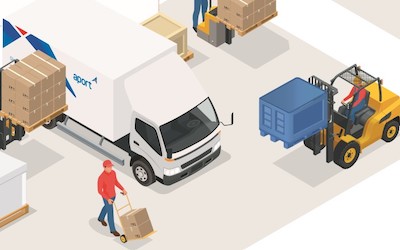
Insurance for Aport’s fulfilment service explained
15/09/2020 / Insurance / posted by Jane Wood
What is Fulfilment?
Fulfilment is the process of receiving orders, processing them, filling those orders and dispatching them to customers.
The fulfilment company will store products and fulfil and dispatch orders using order management systems which integrate with the store, the warehouse management system and the carrier.
Since order fulfilment began with the advent of the mail order catalogues in the 1860s, processes have evolved and become ever more sophisticated. Fulfilment today is an omnichannel process dependant upon a variety of technologies, a network of warehouse spaces and transportation options with flexible strategies. The growth of E-commerce propels innovation and development in this sector.
- Growing businesses use a fulfilment company because it is cost-effective.
- Established businesses turn to fulfilment companies when they outgrow their own storage and order fulfilment capacity.
All types of manufactured product can travel through the fulfilment system, from large pieces of fragile laboratory instrumentation to hazardous goods, temperature-controlled products and small consumables.
What are the risks?
Manufactured items are delivered in bulk into the fulfilment company warehouse. They are accepted, logged in, stored, picked, packed, and then dispatched to order using a variety of carriers.
With this amount of handling and transportation it is inevitable that there will be some element of loss of product. The amount of damage will depend upon the fragility of the items, the size and weight, and whether orders are being collated together into kits or packs. The adequacy of the packaging used is especially important; the packaging should be robust enough to withstand the rigours of handling and transport.
How can we minimise the risks?
The adequacy of the packaging used is especially important; the packaging should be robust enough to withstand the rigours of handling and transport.
Some contracts include an allowance for ‘shrinkage’ which caters for a small amount of damage before losses become the responsibility of the fulfilment company.
Analyzing frequency, cause and financial value of incidents of loss and damage on a regular basis provides the opportunity to improve all aspects of the processes and packaging with a view to reducing loss.
More significant losses such as fire, theft, damage in transit, flood and the like should be covered by insurance – either arranged by the client, or by the fulfilment company for the client.
How does the insurance cover work?
A misconception is that the fulfilment company, or any logistics provider in the supply chain, will be responsible in full for goods for any property lost or damaged. This is not the case.
The fulfilment company will operate under contract conditions which will limit their liability financially based upon the weight of the product they are handling. Conditions such as:
UKWA (United Kingdom Warehousing Association)
BIFA (British International Freight Association)
The fulfilment company will insure their liability under their conditions rather than the products themselves. If loss or damage occurs whilst the product is under the control of the fulfilment company or their subcontractor, the client will make a claim. The fulfilment company will work to establish:
- whether they have any liability
- the extent of that financial liability
They will be storing, handling and shipping a variety of products for different clients, and will not necessarily know the value of those products. By incorporating trading conditions they will have an equal level of liability to every customer, and can plan for the maximum possible loss based on the accumulated weight of product within their warehouse and arrange insurance up to this financial limit.
Insuring this potential liability does not replace the need for insurance to cover the products themselves. The client, as owner of the goods, should ensure that their inventory is fully covered under a policy in their own name, at each stage of the process.
It is possible to insure stock at third party premises under a Commercial Combined insurance policy, and to insure stock in transit under a Goods in Transit or Marine Cargo policy, but a practical way to combine these risks is under a ‘Stockthroughput’ policy. This type of policy is specifically designed to provide continuous insurance cover for your stock through the various stages of:
- Transportation from the manufacturer to the fulfilment warehouse
- Storage / Pick and Pack processes at the fulfilment warehouse
- Dispatch and shipment to customer either in UK or Worldwide
This seamless insurance cover removes the issue of having to establish exactly where the loss or damage occurred to enable you to make your claim under the correct policy.
Your fulfilment company may be able to offer this type of insurance. They will need to know:
- Full details of the product
- The maximum value of your product in store at any one time, taking into account accumulation at any one location
- The maximum value of any one shipment
- The estimated value of goods in transit, split by destination (the premium will be higher the farther the country)
- Any previous storage or transit claims or losses you may have incurred
They will provide a written quotation and the policy arranged will create a direct contractual relationship between the client and the Insurer.
Alternatively, they may offer insurance solely in respect of the Goods in Transit and/or Marine Cargo risks, on an ad hoc or annual basis, issuing Certificates of Insurance as required. Again, the Certificate of Insurance forms the basis of a contract between the client and the Insurer, with the fulfilment company acting as agent.
When this ‘All Risks’, or Full Value insurance cover is in place, if a claim is made and settled under the policy the Insurers have a right to subrogate against the fulfilment centre with a view to recovering the extent of their liability and offsetting that against the amount they have paid.
For more information about Aport Global’s storage and fulfilment offering and the associated insurance contact Jane Wood at woodj@aportglobal.com

